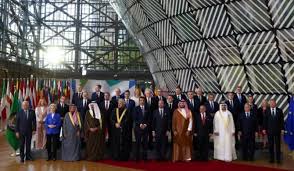EU, Gulf states pave way for new era of shared prosperity

The first-ever EU-Gulf Cooperation Council summit in Brussels earlier this month was a testament to the Gulf region’s growing geopolitical significance on the global stage. Co-chaired by European Council President Charles Michel and Qatari Emir Sheikh Tamim bin Hamad Al-Thani, the summit brought together European and Gulf leaders to discuss a “strategic partnership for peace and prosperity” between two regions that share significant economic, security, and energy interests. The second edition of this biennial summit will take place in Riyadh in 2026.
The summit is a timely acknowledgement of the growing economic and strategic cooperation between Europe and the Gulf. The EU is the GCC’s second-largest trade partner, with the two having exchanged over $180 billion in trade last year. Following the summit, the two sides issued a joint statement confirming their intention to revive talks over an EU-GCC free trade agreement that was suspended in 2008. This comes parallel to the FTA negotiations between the UK and the GCC, highlighting the Gulf’s growing economic prominence for Western partners.
The EU-GCC summit also comes at a time when both regions are diversifying their international partnerships to best reflect the current geopolitical climate. International sanctions on Russia due to its invasion of Ukraine led to an energy crisis that forced Europe to seek hydrocarbon sources for its energy security, and the Gulf emerged as a strong alternative. By turning toward less explored partnerships, the EU also hopes to garner greater support for the international isolation of Russia.
At the same time, the Gulf states are also forging new relationships as they reduce their reliance on the US. This is particularly driven by the region’s economic transformation, which has motivated the Gulf states to diversify economic and security partners in order to ensure a seamless transition. The onset of this interregional cooperation may lead the EU to extend to other GCC members the visa-waiver agreement that it currently has with the UAE.
Despite being two prominent, populous, and prosperous world regions, Europe and the Gulf have not entirely explored the potential for collaboration. However, this has changed in the past two years. By September 2022, there were four EU representations in the Gulf — in Saudi Arabia, the UAE, Kuwait, and Qatar. In June 2023, former Italian Foreign Minister Luigi Di Maio was appointed as the first EU Special Representative for the GCC.
The EU-Gulf Cooperation Council summit is a timely acknowledgement of the growing strategic cooperation between Europe and the Gulf.
This has been a notable year for the institutionalization of this growing relationship, with the first EU-GCC Regional Security Dialogue having taken place in Riyadh in January, the EU-GCC High-Level Forum in Luxembourg in April, and the launch of the EU-GCC Chamber of Commerce in Saudi Arabia in May.
Beyond the economic benefits of cooperation, the growing EU-GCC relationship is also motivated by a shared vision of regional security in the Middle East. With the war in Gaza having persisted for a year, and now having expanded to hostilities between Israel, Lebanon, Iran, and the Houthis in Yemen, interregional cooperation is critical for negotiating a viable ceasefire in order to end the conflict. Europe is already bearing significant consequences of the war and volatility in Ukraine and is thus eager to secure its trade and energy interests in the Middle East. This includes maritime security cooperation with the GCC.
The growing partnership between the EU and the GCC is multifaceted, with the potential to boost cooperation in fields such as clean tech, digital communications, education, and climate change mitigation. Renewable energy provides a particularly promising avenue for collaboration between the two regional organizations. During the World Future Energy Summit in Abu Dhabi in April, the EU launched the EU-GCC Cooperation on Green Transition project to create a joint platform to exchange best practices and expertise between stakeholders, the adoption of policies and technologies to aid the GCC’s green transition, and the creation of a fruitful business environment between EU and GCC green tech companies.
This mutual interest in cleantech and energy security was emphasized at the recent EU-GCC summit. With both regions focusing on a rapid transition to green energy and given the Gulf investments in the field, there is the potential for established European renewable companies to localize in the Gulf and utilize the region’s abundant natural resources in a manner beneficial to both sides. Clean hydrogen was emphasized as being particularly significant for both sides.
Despite numerous avenues of cooperation, the EU-GCC will not be without its challenges. On the strategic front, the two regions have had differences over political solutions and military responses in the Middle East. The GCC countries did not join the EU’s Operation Aspides launched in February to counter Houthi attacks in the Red Sea. To the chagrin of the GCC states, the EU has not been able to develop an effective and coordinated stance on Gaza. Additionally, they are also not keen to emulate Europe’s staunch opposition to Russia.
In the field of renewable energy, the development and export of hydrogen is expensive, and European cleantech companies’ willingness to localize in the Gulf has been slow. There is also the emerging challenge of the EU’s tilt to the right. With right-wing and populist parties making electoral gains across European countries, it remains to be seen whether their anti-immigrant — often anti-Arab — domestic policies will hamper their foreign policy toward the Gulf states. This may not pose a significant challenge as the Gulf states have previously dealt with populist governments by identifying pragmatic areas of cooperation.
Regardless of these challenges, the EU-GCC summit highlights the willingness of these two geopolitical heavyweights to work together and identify the most effective areas of cooperation. While coordinated political strategies develop over time, the two regional organizations are keen to prioritize partnerships in the spheres of trade, energy, technology, and education for a shared and prosperous future.





